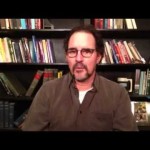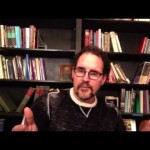Free Will: Are studies that demonstrate genetic determinism a threat to free will?
Category: Q&A
Tags: Calvinism, Determinism, Free Will, Open Theism
Topics: Providence, Predestination and Free Will, Responding to Objections
Greg shares his continuing thoughts on free will with a thought experiment (and a hand-drawn graph!) granting that we are largely determined by forces outside of our control. If we grant this presupposition, does that…
Free Will: What is a free agent?
Category: Q&A
Tags: Calvinism, Determinism, Free Will, Open Theism, Philosophy
Topics: Free Will and the Future
What does it really mean to be a free agent? In this reflection, Greg offers some thoughts on free agents and how it can be that they are not exhaustively determined.
Free Will: The origin of evil
Category: Q&A
Tags: Calvinism, Determinism, Evil, Free Will, Open Theism, Problem of Evil
Topics: Free Will and the Future, Providence, Predestination and Free Will
In this continuing series on free will, Greg discusses how evil can only be accounted for if we acknowledge free will. This is especially true if you believe that God is good.
Free Will: What does Quantum Theory suggest?
Category: Q&A
Tags: Calvinism, Determinism, Free Will, Open Theism, Quantum Physics
Topics: Free Will and the Future, Providence, Predestination and Free Will
Bet you didn’t think we’d be going here. Greg discusses how quantum theory supports the idea of free will.
Free Will: An Aesthetic Model
Category: Q&A
Tags: Calvinism, Determinism, Free Will, Open Theism, Philosophy, Satan and the Problem of Evil
Topics: Free Will and the Future, Providence, Predestination and Free Will
Greg continues his thoughts on free will by offering an aesthetic model for free will. This one gets pretty philosophical, but it’s worth toughing it out.
Free Will: Is it a coherent concept?
Category: Q&A
Tags: Calvinism, Determinism, Free Will, Open Theism, Philosophy
Topics: Free Will and the Future, Providence, Predestination and Free Will
Greg is going to be spending the next several blogs talking about the idea of free will. In this first reflection, he discusses whether it is coherent to speak of a decision that is not…

The Case for Including Open Theism Within Arminianism
Category: Essays
Tags: Arminianism, Essay, Open Theism, Roger Olson
Topics: Open Theism
Here is an excellent post by my good friend Roger Olson in which he makes the case that Open Theism should be embraced by Arminians as an orthodox, if somewhat non-traditional, form of their faith….
How can prayer change God’s mind?
Category: Q&A
Tags: Christian Life, God, Open Theism, Prayer, Theology
Topics: Apologetics, Open Theism
You’ve argued that since God is all-good, he’s always doing the most he can do in every situation to bring about good. But you have also argued that prayer can change God’s mind. How are these two beliefs compatible?

If God is already doing the most he can do, how does prayer increase his influence?
Category: Q&A
Tags: God, Prayer, Problem of Evil, Providence, Q&A
Topics: Defending the Open View, Hearing God, Prayer, Providence, Predestination and Free Will
Question: If God always does the most that he can in every tragic situation, as you claim in Satan and the Problem of Evil, how can you believe that prayer increases his influence, as you…

If God anticipates each possibility perfectly, how does he differ from the “frozen God” of classical theism?
Category: Q&A
Tags: Foreknowledge, God, Open Theism, Q&A
Topics: Attributes and Character, Defending the Open View
Question: If God anticipates each and every possibility as if each were only possibility, how does God ever experience novelty and adventure? It seems that a God who perfectly anticipated (from all eternity) every single…

Drumming, Openness, Providence and Whatever
Category: General
Tags: Apologetics, Faith
Topics: Open Theism
Here’s one of four arguments I offer in this essay against the view that an omniscient God must by definition know the future exhaustively as a domain of eternally settled facts.

Two Ancient (and Modern) Motivations for Ascribing Exhaustively Definite Foreknowledge to God
Category: Essays
Tags: Essay, Open Theism
Topics: Defending the Open View
A historic overview and critical assessment Abstract: The traditional Christian view that God foreknows the future exclusively in terms of what will and will not come to pass is partially rooted in two ancient Hellenistic…

Is Open Theism Incompatible With a Chalcedonian Christology?
Category: Q&A
Tags: Incarnation, Q&A
Topics: Christology, Defending the Open View
Question: The Chalcedonian Creed says Jesus was “fully God and fully human” and that these “two natures” remained distinct in the Incarnation, even though Jesus was one united person. I’m told that part of the…

What is the difference between “libertarian” and “compatibilistic” freedom?
Category: Q&A
Tags: Free Will, Predestination, Q&A, Responding to Calvinism
Topics: Free Will and the Future, Providence, Predestination and Free Will
Question: I often hear philosophers and theologians talk about “libertarian” and “compatibilistic” freedom. What do these terms mean? Answer: A person who holds to “libertarian” freedom believes that an agent (human or angelic) is truly free and morally…

Isn’t God “changing his mind” an anthropomorphism?
Category: Q&A
Tags: Open Theism, Q&A
Topics: Defending the Open View, Providence, Predestination and Free Will
Question: Traditionalists argue that passages that refer to God “changing his mind” are anthropomorphic, depicting God in human terms. Open Theists take these passages literally, however. But if you’re going to take these passages literally,…

How does an Open Theist explain all the prophecies fulfilled in the life of Jesus?
Category: Q&A
Tags: Open Theism, Q&A
Topics: Responding to Objections
Question: Throughout the Gospels it says that Jesus “fulfilled that which was written.” Some of these prophecies are very specific and involve free decisions of people. For example, a guard freely chose to give Jesus…

Open Theism and the Nature of the Future
Category: Essays
Tags: Essay, Open Theism
Topics: Defending the Open View, Free Will and the Future
In this philosophical essay Alan Rhoda, Tom Belt and I argue that the future cannot be exhaustively described in terms of what will and will not happen, but must also be described in terms of…

The Hexagon of Opposition
Category: Essays
Tags: Essay, Open Theism
Topics: Defending the Open View
Throughout the western philosophical and theological tradition, scholars have assumed that the future can be adequately described in terms of what will and will not happen. In this essay I, Alan Rhoda and Tom Belt…

How can people who believe the open view trust a God who doesn’t control the future and doesn’t know for sure what will happen?
Category: Q&A
Tags: Open Theism, Q&A
Topics: Open Theism, Providence, Predestination and Free Will
It’s true that according to the open view of the future things can happen in our lives which God didn’t plan or even foreknow with certainty (though he always foreknew they were possible). In this…








